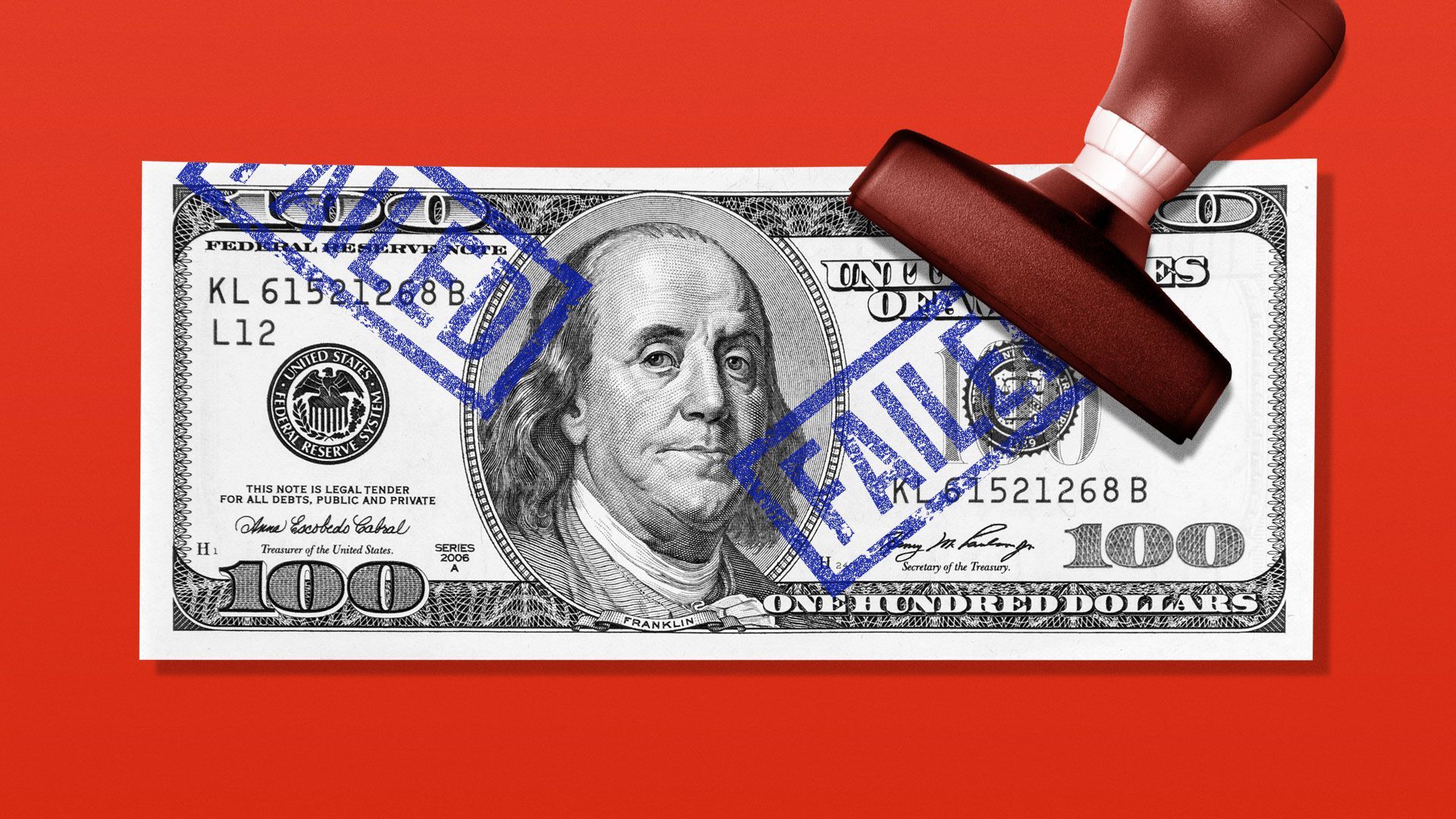| | | | | | | Presented By Divvy | | | | Axios Markets | | By Dion Rabouin ·Feb 01, 2021 | | Welcome to Black History Month! Today's newsletter comes to you from Washington, D.C., where I'm in town to film an interview for the new season of "Axios on HBO." Check out this video from last night's season premiere: Exclusive: Ukraine's Zelensky on the infamous Trump phone call Was this email forwarded to you? Sign up here. (Today's Smart Brevity count: 1,153 words, 4½ minutes.) 🎵 Trivia: Who is the only musician to win the Grammy Award for album of the year with three consecutive studio albums? | | | | | | 1 big thing: The trade war was a failure in every possible way |  | | | Illustration: Eniola Odetunde/Axios | | | | The Biden administration plans to review the phase one U.S.-China trade deal, White House press secretary Jen Psaki said on Friday, along with all of the other "national security" measures former President Trump put in place. - Based on publicly available data, it's hard to imagine they'll find anything other than a debacle.
Driving the news: China isn't even close to fulfilling its end of the deal — having come up 42% short of its commitment, Chad Bown, a fellow at the Peterson Institute for International Economics, reported late last week. Why it matters: The phase one deal was meant to be the Trump administration's reward for U.S. farmers, manufacturers and other business owners who had been bludgeoned by Trump's tax on American businesses via the trade war's tariffs. What was supposed to happen: The trade war was billed as a plan to bring China to its knees by choking off the all-important American market with 25% tariffs on many imports that would rein in the U.S. trade deficit, boost American exports and slow China's rise as a global superpower. What really happened: "The trade war with China hurt the US economy and failed to achieve major policy goals," a recent study commissioned by the U.S.-China Business Council argues, finding that the trade war reduced economic growth and cost the U.S. 245,000 jobs. - Last year, the U.S. trade deficit widened to its largest on record. In the fourth quarter, the U.S. goods trade deficit hit its highest share of GDP since 2012 and the U.S. current account deficit jumped to its highest level in more than 12 years in the third quarter.
- Foreign direct investment to the U.S. fell 49% in 2020 — outpacing the overall global decrease of 42%.
- These trends had all been moving in this direction since 2017, and were accelerated by the coronavirus pandemic as Trump refused to remove tariffs despite their strain on businesses.
The big picture: "The tariffs forced American companies to accept lower profit margins, cut wages and jobs for U.S. workers, defer potential wage hikes or expansions, and raise prices for American consumers or companies," analysts at Brookings noted in August. The other side: China's trade surplus last year hit a record $535 billion, up 27% from 2019. Exports rose 21.1% in dollar terms in November year over year and 18.1% in December from a year earlier, touching an all-time high. - For the full year, the trade surplus with the U.S. was $317 billion, 7% higher than in 2019.
- Foreign direct investment to China rose 4% to $163 billion.
|     | | | | | | Bonus chart: phase 1, year 1 |  Most economists agree that trade deficits don't actually hurt an economy. And while the U.S. trade deficit with China did decrease somewhat during Trump's time in office, the deficit increased with other countries and overall. - Meanwhile, China's trade surplus and its trade with other countries increased.
Watch this space: In addition to hurting U.S. businesses and workers, tariffs also drive up prices, and inflation expectations are starting to rise. - The U.S. current account deficit also is helping further weigh down the value of the dollar, economists say, another factor that could boost inflation.
- Manufacturers, including Whirlpool and Polaris, have recently said they are struggling to meet consumer demand due to supply-chain constraints and coronavirus-related safety measures — both of which are pushing up costs.
|     | | | | | | 2. Catch up quick | | President Biden will meet with a group of Republican senators today who are pitching a compromise coronavirus relief bill that is expected to cost around $600 billion. (The Hill) Sen. Bernie Sanders said that Democrats have the votes to pass Biden's favored $1.9 trillion bill, which would require all 50 Democratic senate votes. (ABC News) The share of research funding to universities from the federal government has declined as private companies make up a bigger proportion of R&D spending, which is hurting entrepreneurship, a new study suggests. (Axios) High-end liquor had its biggest sales increase in at least 40 years. (WSJ) "Commodities are set up for a significant period of outperformance after such a long period of underperformance relative to other asset classes," says Roland Morris, commodity strategist at VanEck Global. (Barron's) |     | | | | | | A message from Divvy | | Take the work out of expense reports | | |  | | | | Old school expense reporting relies on hours of manual effort. The solution: Divvy's 100% free software eliminates expense reports and streamlines reimbursements. The result: Spend less time on processes, more time on growth. Learn more. | | | | | | 3. Why GameStop's stock could rise much, much higher |  Reproduced from S3 Partners. Chart: Axios Visuals The meteoric rise in GameStop's stock price is being called a short squeeze by most but that's not what's happening, says an expert on short interest and the market. Why it matters: That could mean that if and when the short squeeze does come, GameStop's price could soar significantly higher than its current levels. What's happening: Short sellers have piled into GameStop as a result of its meteoric stock price rise, not the other way around, Ihor Dusaniwsky, managing director of predictive analytics at S3 Partners, tells Axios. - Over the past year the amount of shares shorted has increased by 12%, while the total dollars at risk have risen by 1,900%, S3's data show.
- That's a sign that big bets are coming in from hedge funds and institutional investors, meaning that the short squeeze has not even begun.
How it works: In a typical short squeeze, short sellers have sold the stock and "rented" shares with the intent to buy them after the stock's price falls. But they are "squeezed" out if the price rises too much and they are forced to exit the trade by buying the stock at a higher price. - That helps the value of the stock rise because the short sellers join the momentum pushing the price higher.
- But with GameStop, every time a short seller exits the market and buys shares, new short sellers are coming in to replace them, keeping the same downward pressure on the price and, in fact, short interest is increasing.
What it means: "That tells me what's moving the market is the long buyers. This is not a short covering rally," Dusaniwsky says. - "If it was I would see shares shorted dropping precipitously. For this kind of price move, I would have to see short interest being wiped out."
- "One way I can see short interest is not being wiped out is because the stock borrow rate is getting higher.
- "That means shorts are not getting out on a net basis."
|     | | | | | | 4. New home prices hit another record high |  Data: Census Bureau; Chart: Axios Visuals The number of new homes sold in the U.S. reached its highest since 2006 last year, at 811,000, which is an 18.8% increase over 2019, the Commerce Department estimated. - In December, new-home sales rose for the first time in five months, with the median price of a home reaching an all-time high of $355,900.
|     | | | | | | 5. The silver rally has not yet materialized |  Data: FactSet; Chart: Axios Visuals A Reddit post from noted commodities expert RocketBoomGo has markets abuzz about a big move coming in silver prices. Quick note: RocketBoomGo is not a noted commodities expert. What he's saying: "Think about the Gainz. If you don't care about the gains, think about the banks like JP MORGAN you'd be destroying along the way," he wrote on Reddit last week. By the numbers: FactSet data show silver futures rose by nearly 7% and London bullion market prices for the commodity rose by almost 9% on Friday, pushing the precious metal to a recent high. Yes, but: Neither market shows silver prices breaking out of their recent price range. The bump in silver prices as well as in ETFs has yet to equal the runup in prices seen during June and July before RocketBoomGo weighed in on the potential for Gainz. - Silver futures prices fell by 9.6% on Jan. 8.
|     | | | | | | A message from Divvy | | Take the work out of expense reports | | |  | | | | Old school expense reporting relies on hours of manual effort. The solution: Divvy's 100% free software eliminates expense reports and streamlines reimbursements. The result: Spend less time on processes, more time on growth. Learn more. | | | | Thanks for reading! Trivia: Who is the only musician to win the Grammy Awards for album of the year with three consecutive studio albums? Answer: The great Stevie Wonder won AOTY for "Innervisions" (1974), "Fulfillingness' First Finale" (1975) and "Songs in the Key of Life" (1977). - Paul Simon won in 1976 and thanked Wonder at the award ceremony for not releasing an album that year.
| | | | Axios thanks our partners for supporting our newsletters.
Sponsorship has no influence on editorial content. Axios, 3100 Clarendon Blvd, Suite 1300, Arlington VA 22201 | | | You received this email because you signed up for newsletters from Axios.
Change your preferences or unsubscribe here. | | | Was this email forwarded to you?
Sign up now to get Axios in your inbox. | | | | Follow Axios on social media:    | | | | | |









No comments:
Post a Comment